
Top stories


ESG & Sustainability#BudgetSpeech2026: SRD grant unchanged, other Sassa social grants see hike
9 hours



More news












ESG & Sustainability
South Africa’s carbon tax should stay: climate scientists explain why









Charles Dickens, in his novel A Tale of Two Cities contrasts revolutionary Paris with a stable London. In Antony and Cleopatra, William Shakespeare, writing two centuries and a half earlier than Dickens, contrasts the passions and emotions of Rome against Alexandria (today we might say “compares the lifestyles”) by way of the love of Europe's Mark Antony and Africa's Cleopatra for each other.
This year, Artscape presents Antony & Cleopatra at the Maynardville Open-Air Theatre. Shakespeare at Maynardville goes back with an unbroken run to 1956, with this being only the second appearing of the tragic love story. The only previous staging was as far back as 1972 (there have been five Twelfth Nights, so it seems the comedies goes down well with the Cape Town theatrical crowd).
Marthinus Basson is the Director and his stage is stark, consisting of not much more than a “stage upon a stage”: a low, sloping platform that serves in turn as a board room, a meeting place, a battle field, a ship at sea and a carousing table. The lighting design (by Faheem Bardien), to my mind, is nothing less than brilliant. Egypt is portrayed by a few sloping incandescent tubes that glow richly orange, bringing to mind both the pyramids and the sunny climate of Africa. When the Romans are on the stage a row of vertical tubes glow ominously red against a dark background, suggesting some modern (and fascist) Forum from which messengers in dark suits bustle in and out with brief cases like minor bureaucrats serving a military-industrial complex. In the naval scenes the sloping platform becomes edged with blue to suggest the sea.
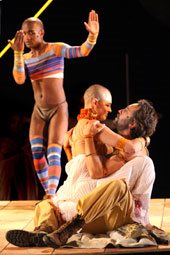
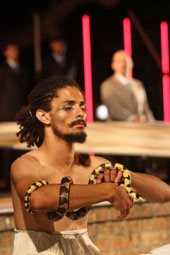
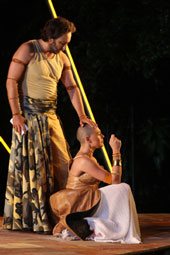
And so to the actors: a play like this stands on the two principal roles. Tinarie van Wyk Loots (great name!) is Cleopatra, suitably beguiling, haughty (after all she is a Queen) and loving in turn, and it seems sometimes all at the same time. She gives a strong and passionate performance, dominating the stage (and Antony) with her power. Her attendants I also thought acted well, and her arrivals on stage surrounded by her arm-waving court evoked some mysterious sea creature moving sinuously through a watery medium.
The Romans are completely different: rough, uncouth (they shout a lot, wave their arms about, quite a few get quite pissed in one scene and one even has to leave to puke offstage). Shakespeare seems to be telling us that Africa is really the civilized continent, not Europe. And we now know what he did not: Africa is indeed the “cradle of civilization” and the source of all humanity. We and our forebears lived and walked on an African stage for millenia when there was no human life, theatrical or otherwise, over the whole of Europe. André Weideman is Mark Antony, ultimately wrecked by his love for Cleopatra. He is better at dominating his fellow Romans that his Egyptian Queen! I felt he came across as a much stronger personality than his fellow Triumvers that then ruled Rome and the whole “civilized world”: Octavius Caesar (Andrew Laubscher) and Lepidus (Mark Hoeben). But this may have been how Shakespeare intended his play to run.
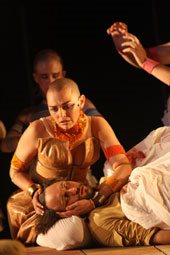
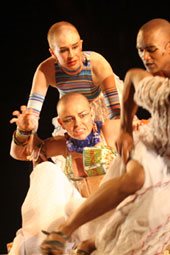
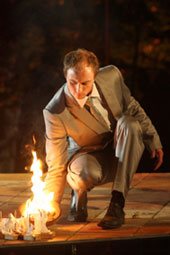
With my watching the play at the beginning of its run, it was notable that all the cast gave a polished performance. I detected not a single slip or hesitation in the play's flow (unless the spear tip that broke free and rolled across the stage was a mistake, but it was neatly picked up and removed, so no matter). Strong performances came also from the minor characters. Dann-Jacques Mouton as the Soothsayer stood out by his sinister presence (yikes! - adorned with live snakes as the programme helpfully warns the front row). Clinton Brown as the eunuch Mardian has little to say (and less to wear) but made his presence felt. Clyde Berning as a dark-suited Eros is described as a batman, but reminded me more of a Monty Pythonesque figure, all earnest with his papers and briefcase.
Shakespeare's plays are more enjoyed with some prior knowledge of the play, so best to do a little Googling before you go, or at least read the helpful synopsis in the programme before curtain up. Then sit back (in the Maynardville's crappy chairs unfortunately), suitably wrapped in a blankie, and enjoy an old love affair and its ultimate tragic end, far better than any TV soap's.